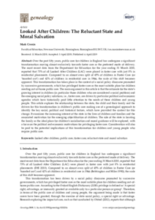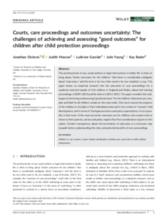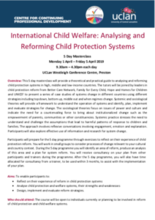Displaying 631 - 640 of 1177
The main argument in this article is that the rationale for the state’s growing interest in children (in particular those children who are considered a social problem) and the emerging social policy solutions, i.e., foster care, are driven by particular political and economic agendas which have historically paid little attention to the needs of these children and young people.
This PhD thesis focuses on the perceptions of children in care whilst they are still in care and subject to youth justice supervision. The findings are based on semi-structured interviews with 19 children in care attending various Youth Offending Teams in the North West of England.
A letter addressed to the UK home secretary from 45 NGOs – including Unicef, the Children’s Society and the NSPCC – has expressed “extreme concern” about the rate of self-harm and suicide among unaccompanied minors in the UK, according to this article from the Independent.
Through the story of one woman, Zara, this article from BBC News highlights a growing trend of parents in the UK (particularly pregnant women) who flee to other countries in the fears that, if they stay, their children will be taken into care.
This snapshot summarises the findings from the responses of 474 16-25 year old care leavers who completed the Your Life Beyond Care (YLBC) survey in 6 local authorities in England - an overall response rate of 30%. This snapshot gives an insight into how care leavers really feel about their lives.
This open access paper draws on empirical research into the outcomes of care proceedings for a randomly selected sample of 616 children in England and Wales, about half starting proceedings in 2009–2010 and the others in 2014–2015. The paper considers the challenges of achieving and assessing “good outcomes” for the children.
This Master Class, taught by David Tobis and Andy Bilson, is for practitioners in the field who are working to reform child protection systems.
In this piece for Thomson Reuters Foundation News, Lumos Senior Advisor, Chloe Setter, writes about recent strides made to include orphanage trafficking in the UK's Modern Slavery Act.
This inspection framework, developed by the UK's Office for Standards in Education, Children's Services and Skills (Ofsted), provides guidance about how children’s homes are inspected, for use from April 2019.
This article will consider the extent to which the protection of child trafficking victims under the jurisdiction of the UK Modern Slavery Act 2015 is sufficient to fulfil the legal positive obligations imposed by EU Law.





